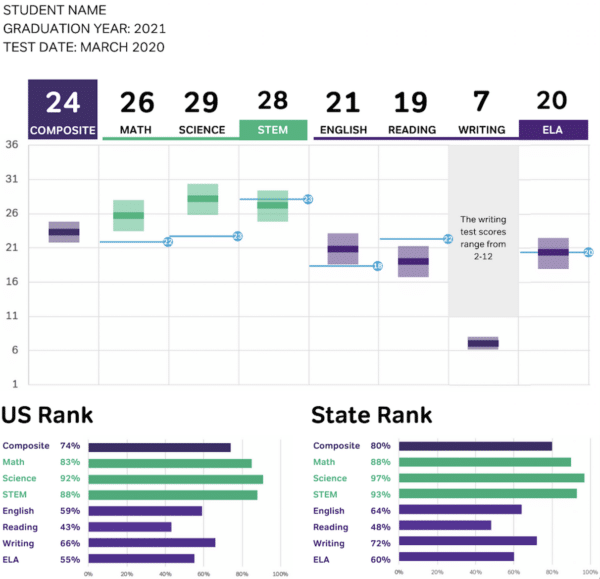
Your ACT Score Report is arguably just as important as the ACT test itself. If you recently took the ACT, you’re probably wondering about your ACT score report dates and what to expect on your report. You might also be wondering about the option of sending free score reports. In this post, we not only answer these questions, but we also provide some insights on how to make the most of your score report.
What is included in my ACT Score Report?
There are three types of score reports: the student report, the high school report, and the college report.
The Student Report
The student report is packed with a lot of useful information, which can help you prepare for a retake and also learn some career insights that could help you with your college prep.
This information includes:
- A breakdown of your different types of scores:
- Composite score
- Section scores
- English Language Arts (ELA) score
- Science Technology Engineering Math (STEM) score
- How your score compares to benchmarks and other test-takers (your percentile)
- Detailed information on how you did on each section
- Schools or scholarship programs you sent a free report to
- Suggestions for career pathways and college readiness based on your scores
- Predictions on how you’d do on a retake

This image is a representation of a portion of the first page of your score report.
The official ACT website actually has an interactive PDF where you can check out the above information in detail in a sample score report.
You can also click here for a detailed description of the PDF
Page 1
On the first page, you see a graph of different breakdowns of your scores: your composite score, your section scores, and your English Language Arts (ELA) and Science Technology Engineering Math (STEM) scores, which are the averages of the scaled scores (or section scores) of the Reading and English tests and of the Math and Science tests, respectively. For each of these types of scores, the graph includes your actual score, your score range (which reflects how your score may vary if you take the test multiple times), and score benchmarks for each section.
Below that, you’ll see your percentiles for each of the score types, comparing you to other test-takers nationally as well as in your state specifically.
Finally, you’ll see a breakdown of how you did on each section. Although you won’t get your raw scores, you will get the number of questions you got right in different sub-categories (as well as percentages), which can be used to find your raw score in each section. This information is particularly useful for understanding which areas you should focus on if you’re planning on retaking the ACT.
Page 2
On the second page, you’ll find information that could help you determine your college and career goals based on your performance on the ACT. You’ll get some insights about the types of jobs you may be well-suited for, whether your reported major seems like a good fit, and where the ACT determines you to be on your college readiness journey. If you sent any colleges or scholarship programs free reports, you’ll get a reminder of what these programs are, along with tips for determining if you need to take a retake and how your score may change with a retake.
The High School and College Reports
The high school and college reports also have the above information and then some. The high school report, which is what your school receives, also includes an image of your essay if you chose to take the Writing test.
The college report, which is sent to each university or scholarship agency that you apply to, is like the high school report plus the grades you reported on up to 30 courses that you took in high school and predictions of your performance in specific college programs and courses.
When and how do I receive my ACT Score Report?
ACT Score Report Dates
You will receive your ACT score report online about 2-8 weeks after most tests. For the October test, the earliest you should expect to receive your scores is three weeks after taking the test; that’s when the test-maker does a process to ensure that the ACT, a standardized test, is truly measuring the same thing across different tests.
This long range of ACT Score Report dates exists in case something weird happens, but two weeks is a pretty safe bet; it’s rare to see your ACT results taking longer than a month. That is, of course, if you didn’t take the optional writing test—in that case, the earliest you would get your overall scores is a month after test day. This is because writing scores are available about two weeks after your multiple-choice scores.
How to Access Your Score Report
To access your report, you log into your ACT account (the same account you used to register). You won’t get a notification when the scores are available, so just start checking your account around the two-week mark (or four weeks if you took the essay)—or you could just wait for others to start posting about it on their social media!
There’s no set ACT score report date for each test-taker, so if you don’t see yours, just keep checking. They tend to release scores in batches. For special testing administrations, such as testing that was sponsored by your state or district, those scores will be mailed to you, which you can access online by creating an account and inputting your ACT ID found on your mailed student score report.
How do I send my ACT Score Report to colleges?
There are two ways you can send your ACT score report to colleges or organizations. You can opt to send your ACT scores to up to four colleges or scholarship programs for free when you register for the ACT or up to five days after taking the test. (Unfortunately, the ACT does not make any allowances for free score reports after your test date, unlike the SAT, which allows students with fee waivers to qualify for some free score reports after the test.) Otherwise, you can pay $13 per school or program for any reports beyond the “free four” or for reports sent after your scores come out.
It’s important to note that if you take the ACT more than once, there is a separate reporting system for each test. In other words, if you take the test again and decide to send your free report to certain programs, those programs won’t see your old ACT scores. So if you want to take advantage of superscoring, you’d have to pay for multiple sets of reports. On the flip side, that does mean that each ACT registration gives you four free reports to work with.
Should I Send My Free ACT Score Reports to Colleges?
It could be tempting to consider sending your four free reports to colleges, but for most students, it might make sense not to take advantage of this option. For others, sending free reports makes sense for economic and strategic reasons.
When You Shouldn’t Send Your Free Reports
If you’re not 100% confident in your ACT performance and you can afford to send multiple score reports, it would be advisable to wait until you get your scores before sending your reports to college. Here’s why:
Your registered programs will receive your score report at the same time you do, so if you bomb your ACT, these programs will automatically receive those bad scores. And once they’ve seen your ACT scores, they don’t unsee them, even if you score significantly higher at a later date. Now, this might not be the worst thing—colleges usually like to see improvement and end up considering your highest ACT scores anyway. But if schools know that you performed terribly on the ACT at one point, particularly selective schools, it could raise a red flag.
Furthermore, if you opt to send your free report with all this in mind and change your mind later, there’s no processing for canceling your request. Sending your scores after you know what they look like offer you more control of the situation and allow you to consider your admissions strategy more carefully.
If you’ve already taken advantage of free ACT score reports and are worried about how you did, don’t panic. Sending free score reports will NOT irrevocably hurt your chances at admissions. But if you haven’t taken advantage of the free score reports, know that it is nice to be able to sweep a potentially bad score under the rug.
When You Should Send Your Free Reports
The reasons why sending free reports make sense include (but may not be limited to):
- You’re sure you won’t do an ACT retake.
- You’ve done well on practice tests and you’re confident that you will do or did well on test day.
- The schools you are applying to require all of your ACT test scores (although even in this situation, it might still be best to wait. Although it’s very rare, there could be a mistake with your scores that you want to sort out first, so it’s best for you to know what the situation is before admissions offices).
- The free reports will reduce the cost burden on you and your family.
The Takeaway
Again, taking advantage of free score reports will not doom your college admissions chances. This goes especially for high school students who need to rely on the free reports or students who are worried about already having sent free score reports.
If something happens and you don’t feel that these scores represent you well (maybe you accidentally bubbled answers in wrong and didn’t realize until you got your scores), you can always write a short explanation on your applications about this. But if you have the means to spend money on your score reports, it’s advisable that you wait until you’re sure you have a good ACT score before sending out score reports.
Summary
Basically, the main thing to know about ACT Score Reports boils down to three points:
- Use Your Report Wisely: The score report doesn’t just tell you how you did on the ACT; you can use the score report to begin preparing for a retake and get a better understanding of your college and career pathways.
- ACT Score Report Dates: Start checking your ACT.org account about two to four weeks after test day, depending on whether or not you took the essay (or keep an eye on the mail if you took the ACT under a special administration).
- Hold Off On Sending Free Reports: If you can avoid sending your free ACT score reports, do it, but it’s definitely not the end of the world AT ALL if you can’t.
We hope you find what you were looking for as it relates to ACT scores reports! If there was something we didn’t cover, make sure you let us know in the comments. Best of luck as you continue on your ACT journey!





Leave a Reply